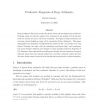Free Online Productivity Tools
i2Speak
i2Symbol
i2OCR
iTex2Img
iWeb2Print
iWeb2Shot
i2Type
iPdf2Split
iPdf2Merge
i2Bopomofo
i2Arabic
i2Style
i2Image
i2PDF
iLatex2Rtf
Sci2ools
94
Voted
BSL
2004
2004
Predicative fragments of Frege Arithmetic
Frege Arithmetic (FA) is the second-order theory whose sole non-logical axiom is Hume's Principle, which says that the number of Fs is identical to the number of Gs if and only if the Fs and the Gs can be one-to-one correlated. According to Frege's Theorem, FA and some natural definitions imply all of second-order Peano Arithmetic. This paper distinguishes two dimensions of impredicativity involved in FA--one having to do with Hume's Principle, the other, with the underlying second-order logic--and investigates how much of Frege's Theorem goes through in various partially predicative fragments of FA. Theorem 1 shows that almost everything goes through, the most important exception being the axiom that every natural number has a successor. Theorem 2 shows that the Successor Axiom cannot be proved in the theories that are predicative in either dimension.
Related Content
| Added | 16 Dec 2010 |
| Updated | 16 Dec 2010 |
| Type | Journal |
| Year | 2004 |
| Where | BSL |
| Authors | Øystein Linnebo |
Comments (0)

